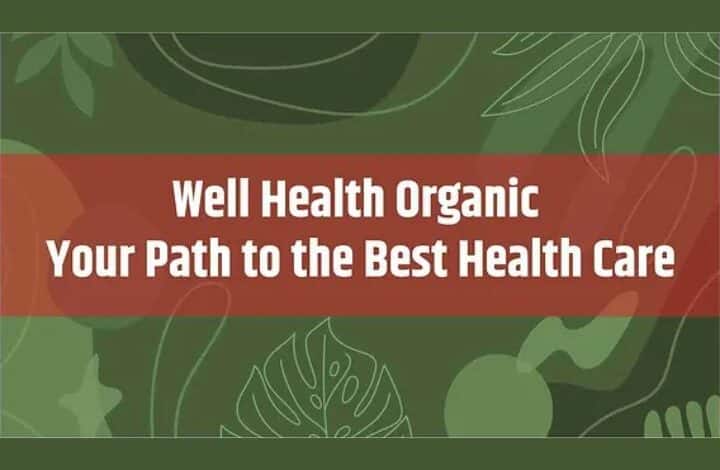
In today’s world, where health and wellness are at the forefront of people’s minds, many individuals are looking for natural and holistic solutions to improve their well-being. One of the most significant trends in this area is the rise of organic products and practices. At the heart of this movement is Well Health Organic, a term that embodies the concept of achieving optimal health through organic, natural, and eco-friendly choices.
This article will explore what Well Health Organic is, its benefits, and how it can impact your overall well-being. Whether you’re new to the organic lifestyle or have been following it for years, this comprehensive guide will provide valuable insights into how organic living can lead to a healthier, more balanced life.
Table of Contents
- What is Well Health Organic?
- The Importance of Going Organic
- Health Benefits of Well Health Organic Choices
- How to Incorporate Well Health Organic Practices Into Your Life
- The Role of Organic Foods in Well Health Organic Living
- Well Health Organic and Sustainable Practices
- Common Myths About Organic Living
- Conclusion
What is Well Health Organic?
Well Health Organic refers to the lifestyle and practices that prioritize organic and natural products for health, wellness, and sustainability. It involves choosing foods, skincare products, cleaning solutions, and other daily essentials that are certified organic and free from synthetic chemicals. Well Health Organic is about promoting a holistic approach to health by integrating organic choices into various aspects of your life, such as diet, fitness, and environmental consciousness.
The concept of Well Health Organic extends beyond just eating organic foods; it’s about adopting an overall mindset focused on well-being, vitality, and sustainability. By incorporating organic options into your daily routine, you can reduce your exposure to harmful chemicals, support sustainable agriculture, and enhance your long-term health.
The Importance of Going Organic
The growing trend towards organic living reflects a deepening awareness of the impact our choices have on both personal health and the environment. Organic’s products are grown without the use of synthetic pesticides, fertilizers, and genetically modified organisms (GMOs), which can pose risks to human health and the environment.
When you choose Well Health Organic’s, you’re not only making a commitment to your health but also supporting farming practices that prioritize soil health, biodiversity, and eco-friendly agricultural techniques. These practices contribute to healthier ecosystems and a more sustainable planet, which benefits everyone in the long run.

Why Choose Organic?
- Nutritional Benefits: Organic foods are often more nutrient-dense, containing higher levels of vitamins, antioxidants, and essential minerals.
- Environmental Impact: Organic farming practices help reduce soil erosion, improve water quality, and promote biodiversity.
- Health Considerations: Organic produce has fewer pesticide residues, which means less exposure to potentially harmful chemicals.
Health Benefits of Well Health Organic Choices
Adopting a Well Health Organic’s lifestyle can have profound effects on your overall health. Whether it’s choosing organic food or using organic skincare products, the benefits are numerous and impactful. Here’s a closer look at the primary health benefits of living an organic lifestyle.
Improved Nutrition
One of the most significant benefits of Well Health Organic is the improvement in the nutritional quality of the food you consume. Studies have shown that organic fruits, vegetables, and grains often contain higher levels of certain vitamins, minerals, and antioxidants compared to their conventionally grown counterparts. These nutrients play a vital role in boosting immunity, promoting healthy skin, and supporting overall well-being.
Organic’s foods are also free from synthetic additives, preservatives, and artificial flavors, which can sometimes have negative effects on your health. By opting for Well Health Organic’s, you’re choosing foods that are rich in essential nutrients and free from harmful chemicals.
Environmental Impact
Choosing organic products doesn’t just benefit your health—it also supports the health of the planet. Well Health Organic practices focus on sustainable farming techniques that reduce the environmental impact of food production. Organic farming avoids the use of harmful pesticides and chemical fertilizers, which can pollute soil and water sources.
By supporting organic farmers and businesses, you help promote biodiversity and reduce your carbon footprint. Organic farming also focuses on improving soil health, leading to more fertile ground that can grow healthier crops for generations to come.
Reduced Exposure to Chemicals
One of the most compelling reasons to embrace Well Health Organic’s is the reduction in chemical exposure. Pesticides, herbicides, and synthetic fertilizers are commonly used in conventional farming. These chemicals can end up in the foods we consume and can contribute to long-term health issues like cancer, hormonal imbalances, and neurological disorders.
By choosing organic, you’re reducing your exposure to these chemicals. Organic’s farming practices rely on natural methods like crop rotation, beneficial insects, and composting to control pests and nourish the soil, rather than resorting to harmful chemicals.
Better Digestion and Gut Health
Another important aspect of Well Health Organic’s is the improvement in gut health. Organic foods, being free from harmful chemicals, are often easier for the body to digest. Organic fruits and vegetables tend to have a more complex and beneficial microbiome compared to conventionally grown crops, which may contribute to a healthier digestive system.
Additionally, organic’s foods are often grown in more nutrient-rich soils, which means they contain higher levels of probiotics and prebiotics that support gut health. Maintaining a balanced gut microbiome is crucial for overall wellness, including immunity, digestion, and mental health.
How to Incorporate Well Health Organic Practices Into Your Life
Making the transition to a Well Health Organic’s lifestyle doesn’t have to be overwhelming. Here are some practical tips for incorporating organic practices into your daily routine:
Start with Organic Food
The easiest way to begin your journey to Well Health Organic’s is by opting for organic foods. Start with the basics, like fruits, vegetables, grains, and dairy. Over time, you can expand to include organic meats, snacks, and even beverages.
Switch to Organic Skincare Products
Your skin is your largest organ, and what you put on it can affect your overall health. Look for organic’s skincare products free from synthetic chemicals and artificial fragrances.
Use Organic Household Cleaning Products
Switch to organic and natural cleaning products to reduce your exposure to toxins while keeping your home fresh and clean.
Practice Sustainable Living
In addition to choosing organic’s products, consider reducing waste, conserving water, and embracing other sustainable living practices that align with Well Health Organic’s principles.
The Role of Organic Foods in Well Health Organic Living
Organic foods play a crucial role in maintaining a Well Health Organic’s lifestyle. These foods are not only free from harmful chemicals but are also richer in nutrients, antioxidants, and essential vitamins. For example, organic vegetables like spinach, kale, and carrots contain higher levels of vitamins A and C, both of which support immune function and skin health. Organic’s fruits like berries and apples are packed with antioxidants that help fight oxidative stress and promote cellular health.
Additionally, organic grains like quinoa, brown rice, and oats are more nutrient-dense and free from harmful pesticides, making them excellent choices for a balanced diet.
Well Health Organic and Sustainable Practices
Sustainability is a key component of the Well Health Organic’s lifestyle. Organic farming promotes sustainable practices that help protect the environment and support biodiversity. Some of these practices include:
- Crop Rotation: This method helps maintain healthy soil and reduce the need for chemical fertilizers.
- Natural Pest Control: Organic farmers use beneficial insects and natural repellents to protect crops instead of relying on harmful pesticides.
- Water Conservation: Organic farms focus on sustainable water use to reduce waste and ensure that crops thrive.
By supporting sustainable organics practices, you’re not only improving your health but also contributing to the health of the planet.
Common Myths About Organic Living
As organic living becomes more popular, several myths have emerged that may discourage people from adopting a Well Health Organic’s lifestyle. Here are a few common misconceptions:
Organic Food is Too Expensive: While organic products may be priced higher, the long-term healths and environmental benefits often outweigh the initial cost.
Organic Food is Not More Nutritious: Research shows that organic foods can contain higher levels of vitamins, antioxidants, and other essential nutrients.
Conclusion
Well Health Organic’s is more than just a trend—it’s a lifestyle that promotes better health, sustainability, and environmental responsibility. By incorporating organic practices into your diet, skincare, and daily routines, you can improve your well-being, reduce your exposure to harmful chemicals, and contribute to a healthier planet.
Choosing organic is a powerful way to take control of your health and support eco-friendly practices. With the increasing availability of organic’s products and a growing awareness of their benefits, there’s never been a better time to embrace the Well Heaths Organic’s lifestyle and make a positive impact on your health and the environment.


